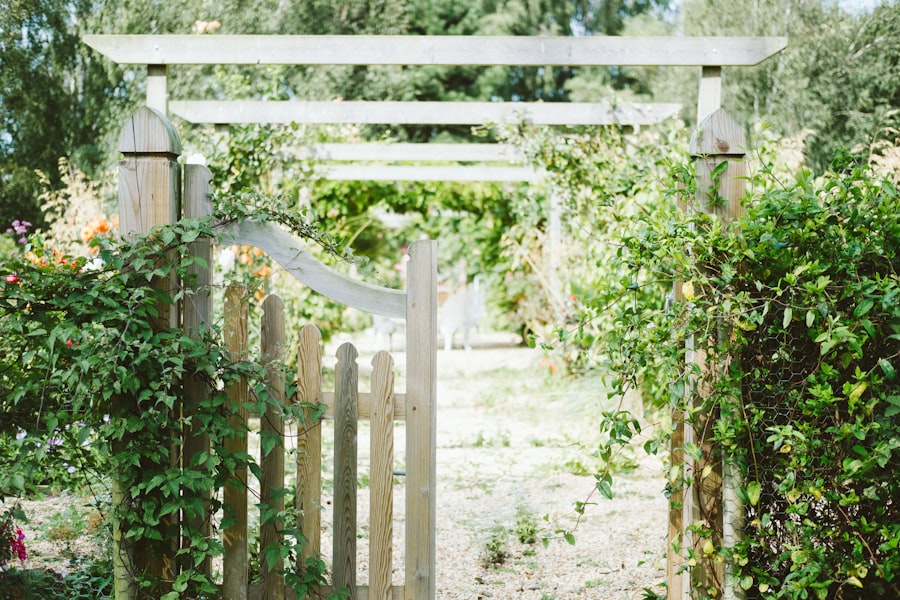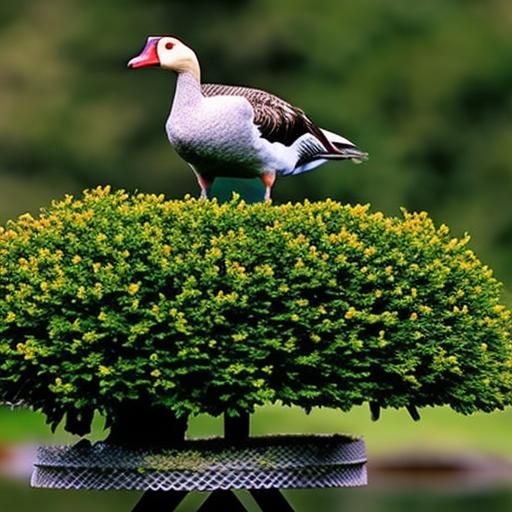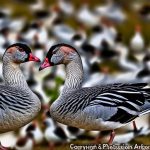Geese invading gardens can be a frustrating problem for many homeowners. These birds are attracted to gardens because they provide a readily available food source and a safe haven from predators. However, there are several methods that can be used to deter geese from invading your garden. In this post, we will discuss different strategies that can be employed to keep geese at bay, including creating physical barriers, using decoys and scare tactics, planting unappealing vegetation, providing alternative food sources, utilizing noise deterrents, implementing water features, using repellents and sprays, building raised garden beds, and seeking professional help.
Key Takeaways
- Geese are attracted to areas with easy access to food and water.
- Physical barriers such as fences and netting can prevent geese from entering your garden.
- Decoys and scare tactics like loud noises or motion-activated sprinklers can deter geese.
- Planting unappealing vegetation like prickly bushes or tall grass can discourage geese from staying in your garden.
- Providing alternative food sources like a nearby pond or grassy area can redirect geese away from your garden.
Understanding the eating habits of geese
In order to effectively deter geese from your garden, it is important to understand their eating habits. Geese are herbivores and primarily feed on grasses, aquatic plants, and grains. They are attracted to gardens because they provide a variety of plants that they find appealing. Geese are particularly fond of tender shoots and young plants, making gardens an ideal feeding ground for them.
To effectively deter geese, it is important to understand their habits and preferences. By knowing what they eat and why they are attracted to gardens, you can take steps to make your garden less appealing to them.
Creating physical barriers to keep geese out of your garden
One effective method of deterring geese from your garden is by creating physical barriers. There are several types of barriers that can be used, including fences, netting, and hedges.
Fences can be an effective way to keep geese out of your garden. A fence should be at least three feet high and made of a material that is difficult for geese to climb or fly over. It is also important to make sure the fence is securely anchored into the ground to prevent geese from digging underneath it.
Netting can also be used as a barrier to keep geese out of your garden. Netting should be placed over plants or areas that you want to protect. It is important to make sure the netting is securely fastened and does not have any gaps that geese can slip through.
Hedges can also be used as a natural barrier to keep geese out of your garden. Hedges should be dense and tall enough to prevent geese from flying over them. It is important to regularly trim and maintain hedges to ensure they remain an effective barrier.
Using decoys and scare tactics to deter geese
Another method of deterring geese from your garden is by using decoys and scare tactics. Geese are wary of predators and will avoid areas where they feel threatened.
One effective decoy is a fake predator, such as a plastic owl or coyote. These decoys can be placed in your garden to create the illusion of a predator and deter geese from entering. It is important to regularly move the decoys around to prevent geese from becoming accustomed to them.
Reflective objects can also be used as decoys to deter geese. These objects, such as shiny tape or aluminum foil, can be hung in your garden to create flashes of light that scare geese away.
Noise and motion can also be used as scare tactics to deter geese. Wind chimes, bells, or even a radio playing can create noise that makes geese uncomfortable. Motion-activated sprinklers or other devices that create sudden movement can also startle geese and keep them away from your garden.
Planting unappealing vegetation to discourage geese
Planting unappealing vegetation is another effective method of deterring geese from your garden. There are certain plants that geese are less likely to eat, making them a good choice for deterring these birds.
Geese are less likely to eat plants with strong odors or tastes. Plants such as lavender, rosemary, and marigolds have strong scents that can deter geese. Additionally, plants with prickly or thorny leaves, such as holly or barberry, can also discourage geese from feeding on them.
Strategically planting these unappealing plants around your garden can create a barrier that geese are less likely to cross. It is important to regularly maintain and prune these plants to ensure they remain effective deterrents.
Providing alternative food sources for geese

Providing alternative food sources for geese can help deter them from your garden. By offering an alternative food source, you can redirect their attention away from your plants.
One option is to set up bird feeders in an area away from your garden. Geese are attracted to bird feeders and will often choose to feed there instead of in your garden. It is important to regularly clean and refill the bird feeders to ensure they remain a reliable food source for the geese.
Another option is to designate a specific feeding area for the geese. This can be an area of your yard where you scatter birdseed or corn for the geese to eat. By providing a designated feeding area, you can encourage the geese to feed there instead of in your garden.
Utilizing noise deterrents to keep geese away
Noise deterrents can be an effective way to keep geese away from your garden. Geese are sensitive to loud noises and will avoid areas where they feel threatened.
One option is to use alarms or noisemakers that are activated by motion. These devices emit loud noises when they detect movement, scaring away geese. It is important to position these devices strategically so that they cover the areas you want to protect.
Another option is to use noise deterrents that emit high-pitched sounds that are unpleasant to geese. These devices can be placed in your garden and emit sounds that are outside the range of human hearing but are uncomfortable for geese.
It is important to use noise deterrents responsibly and considerately. Make sure the noise does not disturb your neighbors and only use them during the times when geese are most likely to be active.
Implementing water features to deter geese from your garden
Water features can be an effective way to deter geese from your garden. Geese are wary of water and will avoid areas where they feel threatened.
One option is to install a fountain or sprinkler system in your garden. The movement and noise of the water can deter geese from entering your garden. It is important to regularly maintain and clean these water features to ensure they remain effective deterrents.
Another option is to create a shallow pond or pool in your garden. Geese are less likely to enter areas with standing water, especially if it is too deep for them to wade in comfortably.
Using repellents and sprays to keep geese at bay
Repellents and sprays can be an effective way to keep geese at bay. There are several natural repellents that can be used, such as garlic or pepper spray.
Garlic spray can be made by crushing garlic cloves and mixing them with water. This mixture can then be sprayed on plants or areas where you want to deter geese. The strong odor of garlic is unpleasant to geese and will discourage them from feeding on the plants.
Pepper spray can also be used as a deterrent for geese. This can be made by mixing hot pepper flakes or powder with water and spraying it on plants or areas where you want to deter geese. The spicy taste of the pepper will discourage geese from feeding on the plants.
It is important to use these repellents and sprays responsibly and without harming other wildlife. Avoid spraying them directly on plants that you plan to consume and make sure to follow the instructions for use.
Building raised garden beds to keep geese from accessing your plants
Building raised garden beds can be an effective way to keep geese from accessing your plants. Raised garden beds elevate the plants off the ground, making them less accessible to geese.
To build a raised garden bed, you will need to construct a frame using wood or other materials. The frame should be at least 12 inches high to prevent geese from reaching the plants. It is important to secure the frame firmly into the ground to prevent geese from digging underneath it.
Raised garden beds also have the added benefit of improving drainage and soil quality, making them a great option for deterring geese while also improving your garden.
Seeking professional help for persistent geese problems
If you have tried various methods and are still experiencing persistent geese problems, it may be necessary to seek professional help. There are wildlife management companies that specialize in deterring geese and can provide effective solutions for your specific situation.
When seeking professional help, it is important to choose a reputable company that has experience in dealing with geese. You can ask for recommendations from friends or neighbors, or search online for wildlife management companies in your area.
In conclusion, there are several methods that can be employed to deter geese from invading your garden. By understanding their eating habits and preferences, you can take steps to make your garden less appealing to them. Creating physical barriers, using decoys and scare tactics, planting unappealing vegetation, providing alternative food sources, utilizing noise deterrents, implementing water features, using repellents and sprays, building raised garden beds, and seeking professional help are all effective strategies that can be used individually or in combination to keep geese at bay. It may take some trial and error to find what works best for your situation, but with persistence and patience, you can successfully deter geese from your garden.
If you’re looking for effective ways to protect your garden from geese, you might also be interested in learning about the benefits of renting a chicken coop. Poultry Wizard offers a variety of chicken coop options, including the option to rent a coop. Renting a chicken coop can not only provide you with fresh eggs but also help deter geese from invading your garden. To find out more about renting a chicken coop and how it can help keep geese away, check out this informative article: Renting a Chicken Coop: A Solution for Garden Protection.
FAQs
What are some common plants that geese like to eat?
Geese are known to enjoy eating plants such as lettuce, kale, spinach, and other leafy greens.
What are some methods to keep geese away from the garden?
Some effective methods to keep geese away from the garden include using physical barriers such as fences or netting, using decoys or scare tactics, and planting unappealing plants that geese do not like.
What are some natural repellents that can be used to keep geese away?
Some natural repellents that can be used to keep geese away include planting herbs such as lavender or rosemary, using garlic or hot pepper spray, and using predator urine.
What are some non-lethal ways to scare geese away?
Non-lethal ways to scare geese away include using noise makers such as air horns or whistles, using visual deterrents such as reflective tape or scarecrows, and using motion-activated sprinklers.
Is it legal to harm or kill geese that are eating my garden?
In most cases, it is illegal to harm or kill geese that are eating your garden. It is important to check with local laws and regulations before taking any action.
Meet Walter, the feathered-friend fanatic of Florida! Nestled in the sunshine state, Walter struts through life with his feathered companions, clucking his way to happiness. With a coop that’s fancier than a five-star hotel, he’s the Don Juan of the chicken world. When he’s not teaching his hens to do the cha-cha, you’ll find him in a heated debate with his prized rooster, Sir Clucks-a-Lot. Walter’s poultry passion is no yolk; he’s the sunny-side-up guy you never knew you needed in your flock of friends!







